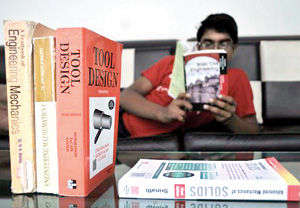The poor B.Tech. pass percentage has academics worried. Some of them want an overhaul of the selection process.
Experts in engineering education in the State say the process of selecting students for the B.Tech. course is partly to blame for the present poor situation of engineering education in the State.
The Hindu-EducationPlus had earlier reported citing a study that one out of every two engineering students in the State either dropped out of the course or failed to clear all the papers. The experts warn that the situation may take a turn for the worse in the coming years, going by the deficiencies in the selection process.
M. Mahadevan, who had served as Principal of the government engineering colleges in Kannur, Kottayam and Barton Hill in Thiruvananthapuram, pointed out that on an all-India basis, about 15 per cent of the Plus Two students in the Mathematics group could get admission to an engineering degree course, whereas in Kerala, more than 45 per cent of the eligible students who appeared for the entrance examination got through.
“This is one of the reasons for the poor pass percentage in the final-year B.Tech. degree course in Kerala,” he said.
Recalling that the pass percentage for the SSLC and the pre-degree courses was around 50 per cent in the 1980s, Prof. Mahadevan said the minimum requirement for B.Tech. admission was then fixed as an aggregate of 50 per cent marks for Physics, Chemistry and Mathematics and as much for Mathematics separately.
 |
Skill set: An aptitude in engineering is a must to be successful in the B.Tech. course.
|
“The marks comprised only theory and practical marks with no continuous evaluation then. In 2011 and 2012, it is reliably learnt that all students were given eight or nine marks in addition to the moderation marks to take the pass percentage to 90,” he said.
Even now, in this liberal marks regime, the minimum requirement remains the same. Prof. Mahadevan said that a student pursuing the higher secondary course in the State who got 180 out of 200 marks in continuous evaluation and for the practical examinations (taken together for Physics, Chemistry and Mathematics) needs only 120 out of 400 marks in the written examinations to meet the eligibility criterion, which is 300 out of 600.
“About 80 per cent of the higher secondary students in the Maths group get 180 or more out of 200 in continuous evaluation and for the practical examinations. Out of the 120 in the written examinations, about 30 marks are obtained in the process of moderation. Actually a student who gets 90 out of 400 (22.5 per cent, without moderation) for the theory papers taken together is eligible to appear for the entrance examination. This is in addition to the liberal valuation followed, whereas for those in the Central Board of Secondary Education and the Indian School Certificate streams, the evaluation process is strict and there are no marks for continuous evaluation,” he said.
Referring to the shortcomings in the evaluation pattern in the entrance examination, Prof. Mahadevan said that a student who got 10 marks out of 480 for Physics and Chemistry put together (paper I) and 10 marks out of 480 for Mathematics (paper II) found a place on the rank list.
“If a student correctly answers three questions out of 120 each in Papers I and II of the entrance examination, his name is included on the rank list. He is likely to get a government seat in one of the engineering colleges in Kerala and is eligible to get a bank loan for studies. This year, out of 1,06,071 candidates who appeared for the engineering entrance examination, only 77,510 have qualified (obtained 10 or more out of 480 marks each for Paper I and Paper II). This means that 28,516 candidates were disqualified (they failed to score at least 10 out of 480 in Paper I and Paper II). This has been happening for the past 10 years,” he said.
On the reasons for the poor pass percentage in engineering colleges, K.P.P. Pillai, former Executive Secretary of the Indian Society for Technical Education, said that there was a time when students who failed to clear the papers after three consecutive attempts were not allowed to pursue the B.Tech. programme further.
“And now students reach up to the last year, with many back papers and no hope of clearing them. A course certificate might give them a job, but we need to think if such a situation is ideal for engineering education in the State. The B.Tech. programme offered here will be rated low across the world in such a situation,” he said.
Suggesting that increasing the cut-off marks for the entrance examination would help in raising the intake quality, Prof. Pillai recalled that a candidate (eligible for reservation benefits) who had secured minus-42 marks in the State entrance examination five or six years ago had figured on the rank list. Advising that parents must see that students with aptitude or engineering skills must only be prompted to join the B.Tech. programme, Prof. Mahadevan urged them not to compel their children to study engineering.
“For an engineering degree course, a student has to appear for 45 theory papers and 10 laboratory examinations. The pass mark is 50 per cent comprising theory and sectional marks. If a student fails in all nine papers after the first year, he/she must take a transfer certificate and join some other course which is not as strenuous as engineering,” he said.
“For each subject, the sectional mark is 50 (25 for class test, 15 for assignment and 10 for attendance). It is easy for a regular student to get 40 or 50 sectional marks and if he gets 50 or 100 in the theory paper and this happens in every subject, he gets first class for B.Tech. You cannot expect a better easy course than this for a regular student,” he said. |


